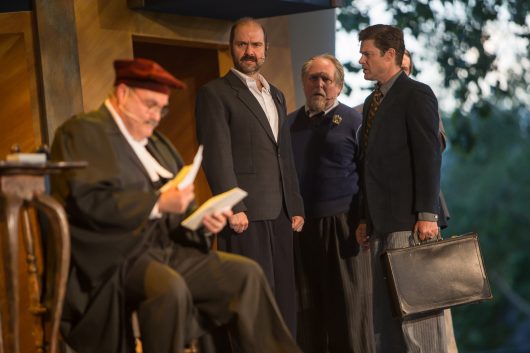Shakespeare’s ‘problem’ play gets powerful reading
Posted on June 26, 2017 By Colin MacLean Entertainment, Front Slider, Theatre
 When Shakespeare penned The Merchant of Venice somewhere during the 1590s, there were few Jews in England – they had been thrown out by the King in the late 13th century. But the hatreds and prejudices that these unfortunate people faced were still fresh enough for the Bard to write what has been termed his great “problem” play.
When Shakespeare penned The Merchant of Venice somewhere during the 1590s, there were few Jews in England – they had been thrown out by the King in the late 13th century. But the hatreds and prejudices that these unfortunate people faced were still fresh enough for the Bard to write what has been termed his great “problem” play.
It’s easy to read The Merchant of Venice as an anti-Semitic vehicle indicative of attitudes of the time, but modern interpretations tend to emphasize the humanity of the characters and see the work as a barometer of the attitudes of our time.
It is a dark and violent play, but since it was first produced as a comedy, it does have moments of lightness.
In the current production in Edmonton, one of two works mounted in Hawrelak Park at the Freewill Shakespeare Festival until July 16, director Marianne Copithorne honours the text and softens the prejudicial elements by demanding human-sized performances. The cast readings are impressive in their clarity and intelligence. There are few moments when you don’t understand every word and motivation of the characters. Most impressive is John Wright as Shylock. Demonstrating all his years in classical theatre, every “d” and “t” is sounded and every emotion is clearly drawn.
 In maintaining a healthy respect for Shakespeare’s intent, Copithorne allows the audience to decide about the “quality of mercy” (a famous quote from the play) as it played out then and plays out today. In her well-calibrated production there are hints of mob violence and reactionary thuggish individuals, and even more frightening is the casual malice of those in power toward an individual who is “different.”
In maintaining a healthy respect for Shakespeare’s intent, Copithorne allows the audience to decide about the “quality of mercy” (a famous quote from the play) as it played out then and plays out today. In her well-calibrated production there are hints of mob violence and reactionary thuggish individuals, and even more frightening is the casual malice of those in power toward an individual who is “different.”
The director sets her brooding drama in the Europe of 1939 when Hitler and Mussolini joined to create the Pact of Steel linking Germany and Italy, and cementing their shared anti-Semitic attitudes. The concept neatly drops the play into a workable time frame and the visual metaphor works throughout.
The story: Antonio (Nathan Cuckow) borrows a sum of money from Shylock (Wright), the local moneylender, so he can pass it to his friend Bassanio (John Ullyatt). Bassanio needs the cash to finance his wooing of the lovely heiress Portia (Belinda Cornish). Shylock, in a moment of mordant humour, makes a condition – the loan must be repaid in three months or he will exact a pound of flesh from Antonio. When poor Antonio can’t make the payment, infuriated by a lifetime of Christian prejudice and the recent betrayal of his daughter, Jessica (Cayley Thomas), who runs off with one of them – Shylock demands his pound of flesh.
Portia disguises herself as a man (no female lawyers in Elizabethan times) and defends Antonio in court. Will she win? Will Antonio be literally skinned alive? Will Shylock’s hatred prevail? Well, you’ll have to see the show. Copithorne’s lacerating production may have the gentry congratulating themselves at how they have brought down the hated “Jew,” but the director adroitly exposes how bigotry affects an entire society. Even Shylock himself must moderate the fires of his revenge (and even renounce his faith) if he is to continue living in the only world he knows.
It’s hard to imagine a local actor better equipped to give us a more shaded version of Shylock than John Wright. Wright keeps threatening to retire, but his continuing vigour and intelligence give us hope that there are many performances still in this fine actor. In his reading, Shakespeare’s famous denunciation of racial hatred rings the righteous bell of truth as he declaims, “If you prick us, do we not bleed? If you tickle us, do we not laugh? If you poison us do we not die? And if you wrong us, shall we not revenge?” At times, Wright affects the hand-wringing subservience of the Jewish cliche but, at others, he rises from the lethargy of an old and bruised man to challenge the moral structure of society in a forceful declaration of his rights before the law. We see him physically age as the play goes on and his final capitulation is wrenching. At the end, his daughter, sitting alone on the stage with her guitar, sings a sad song of a tree whose leaves have all blown away and is left bare and desolate as her father, perhaps in a portent of the horrors his people will endure in our times, carries his one battered suitcase as he shuffles off into an unknown future.
Powerful!
Photos by Lucas Boutilier












